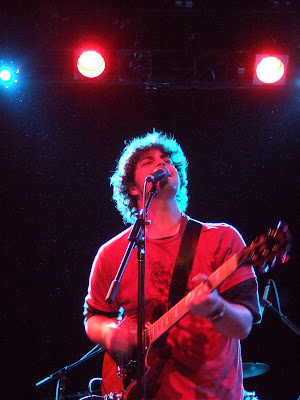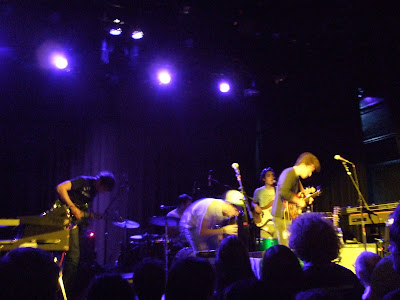
Last month, Angela Poe, Online Marketing, Promotions and Social Media Director at Eenie Meenie Records, an independent (“indie") record label based in California, was laid off.
Instead of using conventional job-search methods, Poe used her publicity background to market herself, sending out an e-mail that linked to her resume. The message was picked up by blogs, including those she had worked with as a publicist. Much like a hot new band that gains online buzz, Poe found herself approached by numerous interested employers.
“Part of the job, working for the label, has always been finding a creative, inexpensive way to make an impact, to find an audience,” Poe said. “Marketing in general isn’t about a user purchasing a product. It’s about them enjoying the experience - they needed it all along, they just didn’t know.”
The music industry is in a bewildering state of contradiction. There is no consensus on what business model will emerge from the current confusion, but the Internet has shattered major label hegemony and ushered in an era of great uncertainty, but also great opportunity. There’s no arguing that these are interesting times – especially for those willing to seize opportunities. Even amidst downturn, there are encouraging signs.
Physical record sales are plummeting, with a 17 percent drop in the shipment of CDs in 2007, according to the Recording Industry Association of America, which represents the major U.S. music labels. Yet digital downloads, both legal and illicit, mean that music has never been able to proliferate so quickly. Job prospects are bleak, and the problem is compounded by the financial crisis, yet actual musicians aren’t necessarily doing poorly.
“It’s purely a financial issue. Indie labels suffer when the economy is bad. People who own and run them have to invest elsewhere. When there’s an economic crisis, no matter how well the artists are doing, the staff has to be downsized to hold up,” Poe said.
Major labels also have suffered. EMI announced in January that it would cut its 4,500 person workforce down to 2,000, and laid off employees at affiliate labels Caroline and Blue Note this summer.
Record stores are disappearing, particularly in New York. 3,100 record stores have closed in the United States since 2003, according to the Almighty Institute of Music Retail, a market research firm, including 80 in Manhattan and Brooklyn. However, live music is immensely profitable, with LiveNation, a concert promoter juggernaut, reporting a 17 percent increase in live concerts produced compared to last year, and a 9 percent increase in revenue. A slew of new venues, both large and small, have recently opened in New York, where LiveNation competes with the Bowery Presents.
“New York has its own economy. It doesn’t seem like the city is affected. Even after 9/11, we were packed a week after,” said Scott Koshnoodi, owner of Littlefield, a new music venue opening in Brooklyn. “The economy here is just so powerful; you have so many young people who don’t want to stay at home. Even in bad times, people want drinks.”
No doubt aided by alcohol, the ”recession-proof” commodity, the Bowery Presents opened a new small venue in Brooklyn, the Music Hall of Williamsburg and a massive 3,000-person club in Manhattan, Terminal 5, a year ago. It has recently expanded to Montclair, New Jersey with another large venue, the Wellmont Theatre.
Unsurprisingly, record labels have attempted to cash in on live revenue. Traditionally, ticket sales and merchandise sold at concerts would go directly to the band, but record labels have initiated “360 deals,” in which the record label gains revenue from merchandise and concert tickets sales as well as CD sales, in return for more career support.
“Turn-around comes from licensing, venue sales, and 360 deals,” said Poe. “As far as the actual sale of the record goes, not a whole lot of money comes from that anyway.”
Thus, in order to stay commercially viable, there are many stores that sell more than just CDs. Massive “big box” chains such as Virgin Megastore and Best Buy also offer clothing, video games, books and DVDs.
“I think companies like Virgin have this ‘we’ll just move with the times’ mission statement. Even though they’re enormous, that doesn’t feel bad to me,” said Poe. “Where else would you find an autobiography of Bob Dylan next to Beatles T-shirts next to a $9.99 Sex Pistols record, with Donny Darko in Limited Edition DVD downstairs?”
The diverse merchandise has paid off. In 2007, Virgin had a 10 percent increase in music sales through fourth period, and an 11 percent increase in DVD sales and a 26 percent increase in video games sales, together with an average increase of 30 percent in fashion and electronics, according to a press release.
But in New York’s competitive real estate market, such a large operation may be unsustainable – not so much because of sales, but rather, because prime real estate is so valuable. Related Companies and Vornado Realty Trust are the landlords for the Virgin Megastore’s Union Square and Times Square locations, huge, iconic store that are flagships for the brand. In September, the two companies finalized their purchase of the 11 nationwide Virgin stores from the Virgin Group. The buy has fueled speculation that the two New York stores, which are underpaying per square foot, will close. Winick Realty Group, a New York-based commercial real estate firm, is handling the Union Square property, according to their website.
A spokeswoman for Vornado declined to comment, but Megan Heckard, who has been working in the music product department of the Union Square store since June, confirmed the imminent closure of the Times Square location in 2009. The Union Square store may last longer – ironically, it may have been saved by the financial crisis – but she suggested that closure was inevitable.
“Because of the recession it is unlikely that any other retailer will want to sign the lease, so we are probably going to keep the whole thing up and running,” she said. “But I mean, it is the general thought that it is only a matter of time though, whether it be months or a few years.”
Kim’s Video Underground is a small video rental and music chain, with its largest location at St. Mark's Place in the East Village. It will be moving at the beginning of the new year to a smaller location on First Avenue. The move includes a 30 percent discount on videos and CDs, and owner Yongman Kim is looking for an organization that will take the 55,000-video rental collection. On signs inside the store, he requests 3,000 square feet of space to maintain the collection, and continue to allow members rental access.
Kim declined to comment for this article, but in an interview with WNYC, he said, “Business is declining. Our lifestyle of entertainment is changing as well.”
But again, it’s not entirely clear if the move is based on declining sales, or an effort to capitalize on prime real estate. Kim owns the building, and a sign advertising “space available” hangs above the store, on its unoccupied upper floors.
In September, a Kim’s Video closed near Columbia University on the Upper West Side and donated its video collection to the university. In 2004, a Kim’s Video closed at Avenue A, in eastern Manhattan.
Other Music, a tiny independent music store, has hung on. It is located across the street from the former location of Tower Records in Greenwich Village, which closed at the end of 2006, and has outlasted its much larger neighbor.
“It’s slower, but we still have our hardcore fans,” said Scott Mou, who works there. “We’re trying to be special.”
In 2007, Other Music opened a digital music store, similar to Apple’s iTunes store, but stocked with obscure and rare releases. “It’s doing well. We’re filling it up with things you expect to see, but also more exclusives,” Mou said, adding his speculation that one day the store could exist entirely online.
Right now, one of the store’s biggest assets is vinyl records. According to the RIAA, in 2007, there were 1.3 million shipments of LPs, compared with 511 million shipments of CDs. While minuscule in comparison, shipments of LPs still increased 36 percent compared with 2006, while shipments of CDs dropped over 17 percent, according to the same data. While vinyl sales are relatively tiny, they appeal to music fanatics who praise the format for its superior sound quality and impressive packaging – the sort of costumers that Other Music attracts.
“The storefront is more important to this store than Virgin Megastore. People still come here to experience music, whether it’s talking about it or listening to it,” Mou said.
Local artists can also use the store to promote their own work, even without being signed to a label. Jon Shina has been performing music for six years, and discovered Other Music at its Cambridge, Mass. location. When that store closed, he came to the New York, and was discussing with the store about carrying his new album, which was self-released.
“If you have a favorite local record store, there’s more of a community. You want your stuff in a community,” said Shina. “You can’t get this at Best Buy. You can’t get it at Virgin.”
His priorities, however, are not sales so much as exposure. “I’d just be happy if anyone listens to my stuff,” he said.
But the record store experience has only a niche audience, particularly with the popularity of digital downloads.
“It’s like describing color to blind people. It’s not like they won’t appreciate it, they can’t,” Poe said. “They don’t know a world without an Internet. They don’t know how to buy music without iTunes. It’s not that they won’t appreciate buying music at a record store, they don’t have the frame of reference of it.”
As for Poe, she has a new job at the Gary Group, a marketing firm that works with concert promoters, record labels and other entertainment outlets.
She described her success this way: “Here’s what I can do for you, because here’s what I can do for myself.”

Angela Poe blogs at music is my boyfriend.

















































